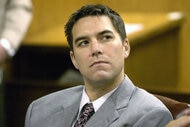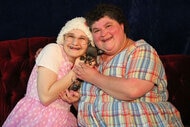Create a free profile to get unlimited access to exclusive videos, breaking news, sweepstakes, and more!
2nd Trial For Murder Of NYC Jogger Found Strangled And Sexually Abused Ends In Conviction
Karina Vetrano's father described his feelings as "jubilation," while Chanel Lewis' attorneys called the verdict "a complete miscarriage of justice."
A man was convicted Monday of killing a woman out jogging near her New York City home in a case that resulted in a mistrial last year.
Karina Vetrano's loved ones erupted in cheers as a Queens jury delivered a guilty verdict in Chanel Lewis' retrial, convicting him of murder and sexual abuse in Vetrano's 2016 death. Prosecutors said Vetrano had been sexually abused and strangled. A previous trial ended in a hung jury in November; the second jury deliberated for only five hours, staying into the night to decide their verdict.
"Jubilation. Justice. Justice has been served," the victim's father, Phil Vetrano, told reporters while leaving court.
Lewis is set to be sentenced April 17 and faces up to life in prison.
Lewis' attorneys from the Legal Aid Society called the outcome "a complete miscarriage of justice." They had unsuccessfully sought a hearing Monday after getting an anonymous letter saying that police had pursued two white suspects before taking DNA samples from hundreds of black men — in what the defense called a "race-biased dragnet" — and coming to focus on Lewis. The letter apparently claims police had initially been searching for two “jacked up white guys from Howard Beach,” according to The New York Daily News, which have received a copy of the letter.
"Our client did not receive a fair trial," the Legal Aid Society said, adding that it would appeal.
The New York Police Department said in a statement that the anonymous letter was "riddled with falsehoods and inaccuracies," and that their investigation was painstaking and "the evidence clearly shows that Chanel Lewis is responsible for her death."
Phil Vetrano found his 30-year-old daughter's body in August 2016 in a park where they often went for runs together.
"She was on her stomach, her right arm under her," he testified about finding her body during the first trial. "Her left arm next to her. Her legs were in a running position. Her head tilted back to the side."
Lewis, 22, was arrested six months later.
Authorities said his DNA was found on Vetrano's neck and cellphone and in a mixture of DNA under her fingernails. His own phone contained downloaded photos of the crime scene and searches for information about the case, police said.
And Lewis taped a confession, saying he was upset at someone else — a neighbor of his who played loud music — and "lost it" when he saw Vetrano.
"One thing led to another," he said in the confession. "Hitting her and stuff like that."
Lewis said he strangled Vetrano but didn't sexually abuse her.
Lewis' defense said that the DNA evidence hadn't been gathered properly and that the confession was coerced and didn't match Vetrano's injuries or some other facts.
Before Lewis' arrest, the investigation prompted police to seek state permission to use a technique known as familial DNA searching — looking for people similar enough to be closely related to whoever left DNA at the crime scene, in hopes they will lead to a suspect.
The state Commission on Forensic Science ultimately agreed in June 2017 to allow familial DNA searching in murder, rape and some other cases. The decision came over the objections of civil libertarians who said the practice entangles law-abiding people in investigations because of their family ties.
By the time the commission gave its approval, Lewis had already been arrested.
The Associated Press contributed to this report.































